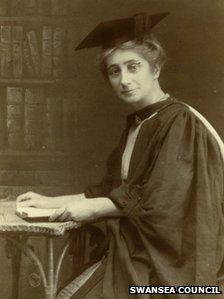Blue plaque for Swansea women's campaigner Emily Phipps
- Published

Emily Phipps was one of the first women to seek election to Parliament
A Swansea headteacher who campaigned for women to have the vote is to be honoured with a blue plaque.
Emily Phipps moved to the city in 1895 to take charge at Swansea Municipal Secondary Girls' School which reputedly became one of the best in Wales.
In 1908 she joined the Women's Freedom League after being outraged by David Lloyd George's anti-suffrage behaviour at a meeting in Swansea.
It will be the city's third plaque dedicated to a local hero.
"The blue plaque scheme is all about recalling people like Emily Phipps and celebrating the contributions they've made to putting Swansea on the map over the years," said Nick Bradley, Swansea council's cabinet member for regeneration.
"Phipps was not only a standard bearer for women's rights - she was also a hugely intelligent women and a terrific teacher who placed particular emphasis on achievement for girls.
"All her work about 100 years or so ago helped pave the way for equal rights and this is why she's so richly deserving of recognition here in Swansea."
The plaque is shortly due to be installed outside the Orchard Centre on Orchard Street to mark the place where Phipps used to teach.
Suffrage boycott
Born in 1865 in Devonport, Devon, Phipps got a first class degree in Latin and Greek from London University before moving to Swansea to take up the teaching post.
After joining the Women's Freedom League, she established a local branch with a lifelong friend and regularly spoke in public for the cause.
On Census night in 1911, she was involved in a suffrage boycott, avoiding completing the survey by sleeping overnight with friends in a cave on the Gower coast.
And in 1918, she was one of 17 women parliamentary candidates in the first general election where women were allowed to stand.
Phipps was also president of the National Federation of Women Teachers for three successive years and a member of its central council from 1913 to 1937.
While still a head teacher, Phipps studied in the evenings to become a barrister.
She was admitted to the bar in 1925, moving to London. She died in 1943.
Phipps will be the third recipient of a blue plaque in Swansea since April.
Already honoured are musician Pete Ham, founder of 1970s rock group Badfinger, and Griffith John, a Swansea missionary who was the first man of his kind to step foot in China.
It is hoped another blue plaque will also be unveiled before Christmas to celebrate the life and achievements of William Grove, a pioneer of fuel cell technology.
- Published27 April 2013
- Published22 November 2012
- Published9 September 2012